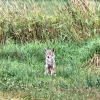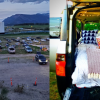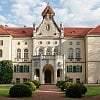Imagine looking out your window and seeing the city you call home being bombed and the military is telling you that you either have to leave or you would be killed. For Latif Kacuri, employment specialist at Kelowna Community Resources, that was his life in 1999 before fleeing Kosovo and making his way to Canada.
In 1999 Kacuri was living in Pristina, the capital city of Kosovo, working as a senior inspector at a research institute when the military forced him out of his home. Kacuri was 44-years-old at the time and had a well-respected job, was well known in the city, and had high status, but all that didn’t matter because his home was in the middle of a war zone.
The Kosovo War that had started a year before was between the Federal Republic of Yugoslavia, which controlled Kosovo before the war and the Kosovo Albanian rebel group. The group was known as the Kosovo Liberation Army (KLA) and they had air support from the North Atlantic Treaty Organization (NATO) and ground support from the Albanian army.
“Military forced us to leave otherwise they wanted to kill us. After three attempts they forced us to leave to get out of Kosovo. The third time one military said if we find you again here we will kill you. Next morning 7:00 a.m., three families decided to flee Kosovo and go to Macedonia,” Kacuri explained.

NATO started bombing Kosovo on March 23rd, 1999 and by the end of April Kacuri fled the city with his brother’s family, his sister’s family, and one of their neighbours. The group packed one pair of shoes each and a change of clothes and headed out to Macedonia, saying goodbye to Kosovo, as they knew it.
Kacuri was unable to bring anything with him when he fled for his safety. When asked what he wished he could have brought with him to Canada, Kacuri quickly said his books and his family photographs of children and marriages.
“I had a lot of books and I liked reading. I don’t have any pictures, that’s the most important. I don’t have any pictures from my family.”
The drive was more than 150 kilometres and was not an easy getaway for Kacuri and his family. Military would search their vehicles and the families would have to pay a bribe to them to let them leave the country. Military also used their cars as guards so NATO wouldn’t bomb them. Tanks would drive between the civilian cars along the way because they knew NATO would not bomb the military if civilians were around.
When the families reached the border of Macedonia they left the vehicles there and walked into the new country. After about a 10-minute walk, the UN high commissioner met with the families and took them on a bus to a refugee camp, which they would soon call home.

Kacuri felt an overwhelming sense of safety and happiness once his family arrived at the camp on April 28th, 1999. Out of the two camps set up in Macedonia, Kacuri was only one of the 20,000 people who had fled war to survive and try to have a normal life again.
“First we were happy because we were able to escape to safety, sometimes refugees were not able to get out,” Kacuri said.
Since the camp was so full of people, one tent was located for Kacuri, his brother and his three children, his sister and her four children, and his son-in-law.

Kacuri said they used mud to make it more comfortable, but it was such a tight squeeze for all of them to stay in, he could not get much sleep that first night.
“I couldn’t sleep. I was thinking about my father, other relatives, and friends had hadn’t fled yet, and I saw that Kosovo was destroyed, burnt, everything. I couldn’t sleep.”
Instead of sleeping, Kacuri went down to the creek and helped people at the pumps that Germany had given the camps to help with filtering water. The UN Commissioner and others were filtering water for refugees as well as unloading food for the days ahead.
For two hours Kacuri helped out these people and during those two hours he was able to clear his mind about the horrible circumstances that were happening in his life at that moment.
During the days to follow at the camp, Kacuri read the newspaper every day to research what countries were accepting refugees. Kacuri describes himself as a very optimistic person and he felt there was something better down the road for him.
After 12 days of living in that small tent, Kacuri learned that Canada was accepting refugees. He decided to fill out applications for his whole family, including his father and his step-mom who eventually fled and landed at the same refugee camp as Kacuri.

The applications were all approved the next day and within less than 48 hours the families were on a plane heading to Nova Scotia, Canada, where they would soon start their new lives as Canadian Citizens.
Kacuri would eventually find his home in Kelowna, but that wouldn't be until he experienced the eastern part of Canada first.
This is a multi-part series by KelownaNow.com. Be sure to check back every Wednesday to learn more about Kacuri's story.
















